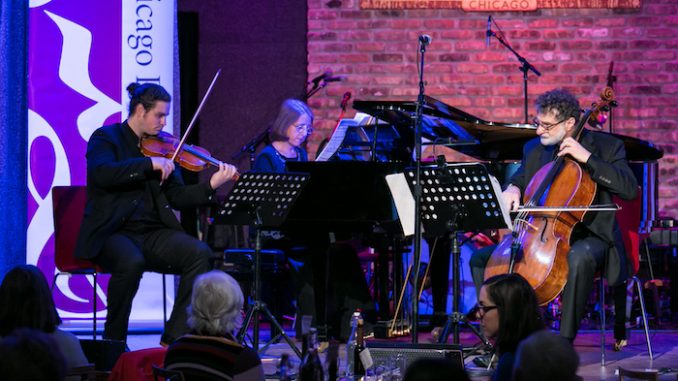
On Sunday, January 21st, 2018 The Chi Phil Chamber Players helped their audience at City Winery, 1200 W. Randolph, Chicago to ring in the New Year. Berlin to Buenos Aires was a rich concert of international favorites performed by a very special family of musicians: Beatriz Helguera-Snow, piano; Andrew Snow, cello; and their son, Alan Snow, violin, who introduced the music.
THE PROGRAM:
– Felix Mendelssohn Trio in D Minor for violin, cello and piano Op. 49, 1839, 1846
Piano Trio No. 1 is the composer’s most popular and considered to be the greatest of his chamber works. After he revised the piano portion in a more distinctly lyrical style- beautifully rendered this afternoon by Helguera Snow- it was reviewed by Schumann who pronounced Mendelssohn to be “the Mozart of the nineteenth century, the most illuminating of musicians.” Although the pianist advised this reviewer that the 2nd movement “Contains all of the beauty in the world”, I was personally knocked out by the opening movement, into which Alan Snow launched with a fervid intensity he kept up throughout the concert. It was particularly moving to watch the incomparable virtuoso Andrew Snow working looking to his son as the piece developed.

The great Trio opened with the cello heralding an achingly beautiful overarching fine melody that led into the violin’s supporting theme. The entire movement seemed to propel itself forward in a united large melodic span; the music alternates between the gentle and the immensely dramatic.
The lovely Andante contains a residue of melancholy with what has been described as “a contrasting, passionate middle section.” The 3rd movement Scherzo is otherworldly and mischievously ingenious leading into the finale, Allegro assai appassionato. Less sensational than the opening, it contains a twice-introduced “broad, throbbing melody of great melancholy yearning.”
– Astor Piazzolla Histoire du Tango – “Café 1930” and “Nightclub 1960”, 1986
The great Argentinian tango re-creator extraordinaire’s Histoire du Tango is an effort to describe- in musical form- the history and evolution of the tango in four movements. This day’s concert presented 2 of these; Piazzolla ‘s own program notes that expand on the individual movements follow:
“Cafe, 1930: This is another age of the tango. People stopped dancing it as they did in 1900, preferring instead simply to listen to it. It became more musical, and more romantic. This tango has undergone total transformation: the movements are slower, with new and often melancholy harmonies. Tango orchestras come to consist of two violins, two concertinas, a piano, and a bass. The tango is sometimes sung as well.
Night Club, 1960: This is a time of rapidly expanding international exchange, and the tango evolves again as Brazil and Argentina come together in Buenos Aires. The bossa nova and the new tango are moving to the same beat. Audiences rush to the nightclubs to listen earnestly to the new tango. This marks a revolution and a profound alteration in some of the original tango forms.”
Originally written for flute and guitar, the pieces were performed this afternoon by piano and violin, offering the audience a fine opportunity to appreciate the virtuosity of the youngest Snow.
Café 1930 gave us a Tango that is slower than expected, more introspective and sadder, and clearly not just for dancing. Nightclub 1960 was infused by other musical influences, and contains hints of the bossa nova from Brazil. The performers offered up a clear version of the passionate and dramatic- yet refined- style of the tango that made Piazzolla an icon.

-Fritz Kreisler Miniature Viennese March, 1925
Fritz Kreisler was one of the most beloved musicians of the 20th century, an extraordinary violinist as well as a fine composer of what has been called “his inimitable miniatures.” He was renowned for his expressiveness and the sweetness of his tone. In this sparkling short piece, lovingly and joyously rendered as the finale of this concert, one could hear echoes of the Vienna of the past, before the Great Wars, when life was slower, richer, and filled with grace.
For information and tickets to all the great programs of The Chicago Philharmonic, go to www.chicagophilharmonic.org
All photos by Elliot Mandel

Be the first to comment